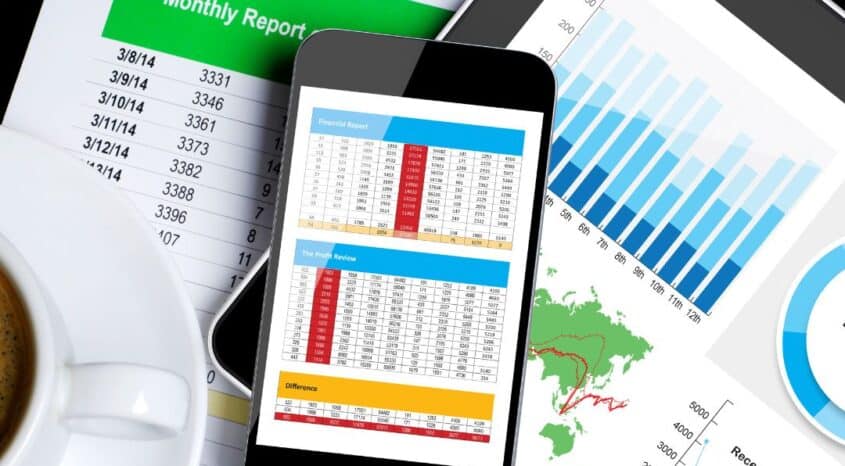From stubborn inflation rates and increasing costs to ongoing disruption from AI and supply chain pressures, there’s a long list of challenges facing retailers right now.
One of the biggest problems – and the biggest threat to the already slim high-growth and low-profit models many operate under – is manual workflows, such as:
- Clearing out emails
- Logging data
- Dealing with spreadsheets
- Managing payments and invoices
- Analyzing sales reports
- Stock replenishment
Millions of businesses have become completely bogged down by manual operational tasks like these, spending an average of more than 290 hours a year on tedious admin alone, according to research by Brightpearl by Sage.
Many are spending so much time on manual chores that it’s leading to burnout and inefficiency. Brightpearl’s research shows:
- Three-quarters (75%) feel ‘overwhelmed’ by the amount of work admin they have to do
- Seven in ten (69%) say they’ve completed work admin on a weekend or non-working day
- More than a quarter (29%) have taken time off work specifically to do manual tasks
A solution is urgently needed. Fortunately, it already exists in the form of end-to-end automation.
End-to-end automation means implementing tech solutions that cover every aspect of your operations. On the front end, this includes automating customer comms, sales processes and even your marketing. On the back end, it extends to supply chain management, inventory planning, finance-related tasks and data analysis.
Benefits of automation
A major benefit of automation is significant time savings; the average retailer using Brightpearl Automation saves 352 hours a year.
However, the impact of automation goes beyond time savings. It greatly increases the speed and efficiency of operations, reducing mistakes and ensuring tasks are done quickly and correctly.
With laborious administrative tasks handled by automation, employees become more productive. This change improves job satisfaction and overall well-being, which in turn positively impacts your profits.
The majority of retailers recognize the opportunity that automation presents – 64% agree that investing in automation tools would improve their speed and efficiency – and many are already leveraging the automation tools at their disposal.
Based on the latest research by Brightpearl, we’ve created this ultimate guide to the automation tools being used by retailers from the UK and the US, with different turnovers.
Official Top 10 Automation Tools (Overall)
1. Shopify
Shopify is an e-commerce platform that enables retailers to create and manage online stores. Retailers use Shopify to automate sales processes, manage inventory and process payments.
2. Quickbooks
QuickBooks is an accounting software used by businesses to manage financial transactions, payroll, and tax preparation. Merchants use QuickBooks to automate bookkeeping tasks, generate financial reports and ensure tax compliance.
Inventory Planner is a forecasting and inventory planning tool that helps retailers optimize stock levels and prevent overstocking or stockouts. As well as automated demand forecasting, Inventory Planner offers reliable, automated buying recommendations and automated PO creation for fast, easy replenishment.
4. BigCommerce
BigCommerce is an e-commerce platform designed for businesses to create online stores. Retailers use BigCommerce to manage products, process orders and integrate with various sales channels to streamline operations.
5. Mailchimp
Mailchimp is a marketing automation platform that provides email marketing services. Retail brands use Mailchimp to create and automate email campaigns, manage customer lists and track marketing performance.
6. Magento
Magento is an open-source e-commerce platform that offers flexibility and control over the look, content, and functionality of online stores. Growing merchants use Magento to automate sales processes, manage products and customize the shopping experience.
7. Xero
Xero is a cloud-based accounting software that helps businesses with bookkeeping, invoicing, and financial reporting. Retailers use Xero to streamline their accounting processes and gain real-time insights into their financial health.
Zoho Commerce is an e-commerce platform that helps businesses create online stores and manage their sales operations. Retailers use Zoho Commerce to automate order processing, inventory management and customer engagement.
9. SPS Commerce
SPS Commerce is a retail network that provides cloud-based supply chain management solutions. It’s used in retail to automate trading partner transactions, streamline order fulfillment and improve supply chain visibility.
“For many retailers the complexity involved in orchestrating the day-to-day operations prevents their teams from preparing for tomorrow. They can often feel like firefighters trying to keep up with all of the different responsibilities, but end-to-end automation allows retailers to run their ecommerce operations more efficiently and instead spend more time focusing on strategic and future-looking initiatives.” – Melissa Clark, Director of Corporate Product Marketing
10. WooCommerce
WooCommerce is an open-source e-commerce plugin for WordPress that enables retailers to create online stores. Retailers use WooCommerce to manage products, process payments and integrate with various plugins to enhance store functionality.
‘Growing numbers use Brightpearl Automation’
“Retail businesses across the UK are being suffocated by manual admin work, which is draining productivity, overwhelming staff and stunting growth,” says Mark Hook, Product Marketing Director at Brightpearl. The best way to reduce both complexity and cost in this economic climate is simply to automate as much of your operation as possible.
“Brightpearl is a cutting-edge tool for automation that saves retailers huge amounts of time – 352 hours a year on average – as well as reducing labor costs, minimizing errors and increasing the speed of your operation.
“It didn’t quite make the list of top 10 tools this time, but we expect that to change as growing numbers of retailers switch on to the power and versatility of Brightpearl Automation and how it can be used to automate some of the most-hated manual tasks – from order processing to inventory planning.
“Our on-demand webinar reveals how leading retailers are using Brighpearl to automate their operations. It’s a great way to see for yourself how automation can save time and money.”
Keep reading for the complete breakdown for the UK, US, different turnovers and different sectors 👇
UK Breakdown 🇬🇧
Top 10 Automation Tools (UK only)
- Shopify
- Quickbooks
- Xero
- Inventory Planner
- BigCommerce
- Mailchimp
- Magento
- Zoho Commerce
- SPS Commerce
- WooCommerce
Top 10 Automation Tools (UK, Start Up Retailers – Turnover <£1M)
- Shopify (‘used most for automation’ by 51% of retailers)
- Quickbooks
- Inventory Planner
- Xero
- Magento
- WooCommerce
- SPS Commerce
- BigCommerce
- Mailchimp
- Klaviyo
Top 10 Automation Tools (UK, Scaling Retailers – Turnover £1-50M)
- Shopify (‘used most for automation’ by 49% of retailers)
- Quickbooks
- Xero
- Mailchimp
- Magento
- Zoho Commerce
- Inventory Planner
- WooCommerce
- SPS Commerce
- Klaviyo
Top 10 Automation Tools (UK, Large Retailers – Turnover £51-100M)
- Shopify (‘used most for automation’ by 37% of retailers)
- Quickbooks
- Xero
- Avalara
- Inventory Planner
- Magento
- SPS Commerce
- WooCommerce
- Klaviyo
- Mailchimp
Top 10 Automation Tools (UK, Major Retailers – Turnover £100M+)
- Shopify (‘used most for automation’ by 38% of retailers)
- Quickbooks
- Xero
- Inventory Planner
- Mailchimp
- BigCommerce
- Magento
- Avalara
- Zoho Commerce
- WooCommerce
Analysis: ‘Need for niche automation tools in the UK’
Brightpearl’s Mark Hook says: “The breakdown of data here reveals that automation tools that integrate well with business processes and provide scalability are key. There’s widespread adoption of Shopify for its comprehensive e-commerce capabilities and the strong presence of accounting solutions that are able to automate financial administration.
“The results also highlight the for niche automation solutions in the UK retail market – Inventory Planner is especially popular, while tools like Klaviyo and Avalara are winners with larger retailers, indicating growing adoption of specialized inventory, marketing and tax automation tools.”
US Breakdown 🇺🇸
Top 10 Automation Tools (US only)
- Shopify (‘used most for automation’ by 28% of retailers)
- Quickbooks
- Zoho Commerce
- BigCommerce (22%)
- Mailchimp (22%)
- SPS Commerce (20%)
- Klaviyo (18%)
- WooCommerce (18%)
- Inventory Planner (18%)
- Xero (14%)
Top 10 Automation Tools (US, Start Up Retailers – Turnover <$1M)
- Zoho Commerce
- Shopify
- Quickbooks
- Xero
- Inventory Planner
- Mailchimp
- Klaviyo
- WooCommerce
- SPS Commerce
- Shipstation
Top 10 Automation Tools (US, Scale Up Retailers – Turnover $1-50M)
- Mailchimp
- Zoho Commerce
- Klaviyo
- BigCommerce
- SPS Commerce
- Quickbooks
- WooCommerce
- Shopify
- Inventory Planner
- Xero
Top 10 Automation Tools (US, Large Retailers – Turnover $51-100M)
- Shopify
- BigCommerce
- Zoho Commerce
- SPS Commerce
- Klaviyo
- WooCommerce
- Quickbooks
- Mailchimp
- Inventory Planner
- Shipstation
Top 10 Automation Tools (US, Major Retailers – Turnover $100M+)
- Shopify
- BigCommerce
- Klaviyo
- Inventory Planner
- Magento
- Shipstation
- Zoho Commerce
- WooCommerce
- Quickbooks
- SPS Commerce
Analysis: ‘Shopify reigns supreme… but specialized tools are key’
Mark Hook says: “Once again, Shopify reigns supreme as the most popular automation tool among US e-commerce retailers, with significant adoption across all business sizes.
“Zoho Commerce is particularly important for small retailers and in sectors like pet supplies.
“Tools like Klaviyo and SPS Commerce feature heavily, indicating a growing demand for specialized marketing and supply chain automation solutions. Meanwhile, Inventory Planner is particularly favored in niche markets like jewelry & accessories and pet supplies, showcasing the need for targeted inventory planning tools for high-volume retailers with numerous product variants.”
Feeling bogged down by manual tasks in your business?
▶️ Hear how leading retail brands are using automation to save time and money in our free on-demand webinar. Watch it now.




